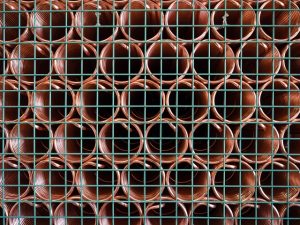 When companies utilize advanced, modern versions of electrical cooling solutions, the advantages that often come with them can be significant to the companies’ overall efficiency. With a heavy reliance on technology of all types to help streamline their operations, the boost in efficiency and productivity in their electrical cooling capabilities can have a substantial, positive impact on nearly every aspect of a company’s operation. The specific advantages that companies value most about heat exchangers can vary, but many of the most significant ones stem directly from modern heat exchangers’ use of more efficient and eco-friendly thermal management techniques. (more…)
When companies utilize advanced, modern versions of electrical cooling solutions, the advantages that often come with them can be significant to the companies’ overall efficiency. With a heavy reliance on technology of all types to help streamline their operations, the boost in efficiency and productivity in their electrical cooling capabilities can have a substantial, positive impact on nearly every aspect of a company’s operation. The specific advantages that companies value most about heat exchangers can vary, but many of the most significant ones stem directly from modern heat exchangers’ use of more efficient and eco-friendly thermal management techniques. (more…)
What Transferring Heat Means in Modern Heat Exchangers
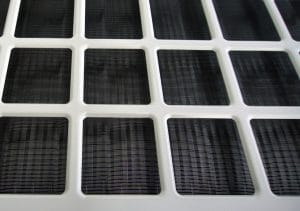 As many other forms of technology have become increasingly more complicated as they’ve advanced, modern electrical cooling solutions have followed the trend of simplification. For example, in conventional cooling solutions, the most-often relied on solutions included air conditioning and air compression processes that created cold air to prevent overheating. Today, however, more advanced and efficient thermal management solutions are designed to simplify the process by utilizing an eco-friendly cooling fluid to absorb and transfer the heat continuously. Though the heat transfer process is significantly more streamlined, it’s also capable of producing higher-performance electrical cooling with greater efficiency. (more…)
As many other forms of technology have become increasingly more complicated as they’ve advanced, modern electrical cooling solutions have followed the trend of simplification. For example, in conventional cooling solutions, the most-often relied on solutions included air conditioning and air compression processes that created cold air to prevent overheating. Today, however, more advanced and efficient thermal management solutions are designed to simplify the process by utilizing an eco-friendly cooling fluid to absorb and transfer the heat continuously. Though the heat transfer process is significantly more streamlined, it’s also capable of producing higher-performance electrical cooling with greater efficiency. (more…)
Why Transferring Electrical Waste Heat Is More Efficient
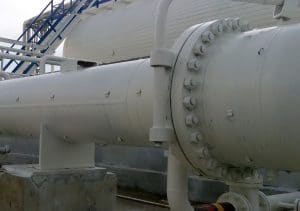 The course of advancement for most forms of technology have followed a path of increasingly more powerful and efficient solutions. For example, applications ranging from large-scale manufacturing machinery to automated systems and technologies have all benefited from innovations that have made the applications more powerful. However, while technology comes in different forms and has advanced in different ways, the evolution of electrical thermal management has been a key to success in most of them. For most applications, that evolution has involved the transformation of traditional electrical cooling processes, such as the implementation of natural heat transfer processes. (more…)
The course of advancement for most forms of technology have followed a path of increasingly more powerful and efficient solutions. For example, applications ranging from large-scale manufacturing machinery to automated systems and technologies have all benefited from innovations that have made the applications more powerful. However, while technology comes in different forms and has advanced in different ways, the evolution of electrical thermal management has been a key to success in most of them. For most applications, that evolution has involved the transformation of traditional electrical cooling processes, such as the implementation of natural heat transfer processes. (more…)
How Heat Exchangers Improve Food & Beverage Production
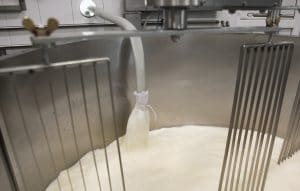 Over the last several decades, heat exchangers have helped streamline electrical cooling and several other essential thermal management processes for companies in all industries. For some industries, however, the impacts of this innovation have been more profound than they have in others. For example, while all companies can benefit from more efficient electrical cooling for their various technologies, companies in industries like food & beverage production have benefited even greater by utilizing heat exchangers for several core production processes. With the more natural and eco-friendly thermal management processes, heat exchangers can help food & beverage companies create safer and more efficient processes throughout their entire operations. (more…)
Over the last several decades, heat exchangers have helped streamline electrical cooling and several other essential thermal management processes for companies in all industries. For some industries, however, the impacts of this innovation have been more profound than they have in others. For example, while all companies can benefit from more efficient electrical cooling for their various technologies, companies in industries like food & beverage production have benefited even greater by utilizing heat exchangers for several core production processes. With the more natural and eco-friendly thermal management processes, heat exchangers can help food & beverage companies create safer and more efficient processes throughout their entire operations. (more…)
More Efficient Below-Ambient Cooling Capabilities
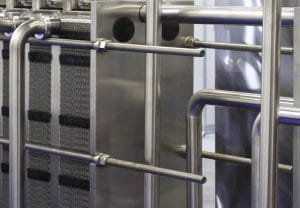 Ever since heat exchangers first became popular among companies in different industries, they’ve created increasingly more ways for companies to streamline their electrical thermal management processes. The more innovative these solutions have become, the more efficient and cost-effective they are for the companies that utilize them. While heat exchangers are traditionally designed to maintain effective ambient cooling by consistently transferring waste heat, more advanced versions are also able to bring the same level of efficiency and cost-effectiveness to applications that require below-ambient cooling capabilities. (more…)
Ever since heat exchangers first became popular among companies in different industries, they’ve created increasingly more ways for companies to streamline their electrical thermal management processes. The more innovative these solutions have become, the more efficient and cost-effective they are for the companies that utilize them. While heat exchangers are traditionally designed to maintain effective ambient cooling by consistently transferring waste heat, more advanced versions are also able to bring the same level of efficiency and cost-effectiveness to applications that require below-ambient cooling capabilities. (more…)
When Companies Invest in Eco-Friendly Electrical Cooling
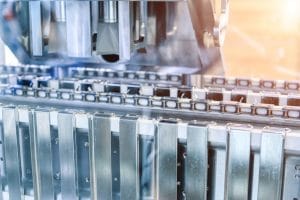 These days, utilizing advanced technology for most or all operations is the norm for companies in most industries. As more powerful and streamlined technologies becomes increasingly more dominant in their operations, companies have also relied more heavily on effective thermal management solutions to keep these applications properly cooled. Today, those solutions often take the form of modern heat exchangers, which continue to provide numerous benefits in the real of electrical thermal management. Heat exchangers are designed to create high-performance cooling using more natural thermal management methods, allowing them help companies institute more efficient and eco-friendly electrical cooling process. (more…)
These days, utilizing advanced technology for most or all operations is the norm for companies in most industries. As more powerful and streamlined technologies becomes increasingly more dominant in their operations, companies have also relied more heavily on effective thermal management solutions to keep these applications properly cooled. Today, those solutions often take the form of modern heat exchangers, which continue to provide numerous benefits in the real of electrical thermal management. Heat exchangers are designed to create high-performance cooling using more natural thermal management methods, allowing them help companies institute more efficient and eco-friendly electrical cooling process. (more…)
Using Heat Exchangers to Streamline Wastewater Treatment
 Some of the most important ways in which heat exchangers have impacted modern companies involve their ability to significantly streamline the electrical cooling process. Most companies rely on various forms of technology, and heat exchangers are able to efficiently cool these applications with high levels of efficiency and minimal amounts of energy. However, maintaining efficient electrical cooling hasn’t been the only impact that heat exchangers have had. In increasingly more applications, companies are also utilizing their advanced heat transfer capabilities to help streamline wastewater treatment and other processes that rely on thermal management techniques. (more…)
Some of the most important ways in which heat exchangers have impacted modern companies involve their ability to significantly streamline the electrical cooling process. Most companies rely on various forms of technology, and heat exchangers are able to efficiently cool these applications with high levels of efficiency and minimal amounts of energy. However, maintaining efficient electrical cooling hasn’t been the only impact that heat exchangers have had. In increasingly more applications, companies are also utilizing their advanced heat transfer capabilities to help streamline wastewater treatment and other processes that rely on thermal management techniques. (more…)
Why Eco-Friendly Electrical Cooling Matters
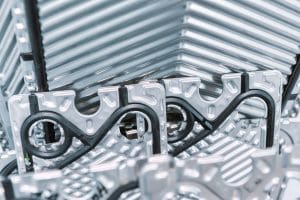 When it comes to enhancing operations in most industries, the main focus is typically on improving a company’s overall efficiency and productivity. Companies often seek to implement the technological solutions that will most effectively boost their output or reduce their costs of operations. In the realm of electrical thermal management, the goals of implementing more advanced solutions are the same. However, companies today also have to consider how their operations impact the environment around them. With more streamlined heat exchangers, they can enjoy significantly more eco-friendly electrical cooling that can help make the rest of their operations more environmentally friendly, as well. (more…)
When it comes to enhancing operations in most industries, the main focus is typically on improving a company’s overall efficiency and productivity. Companies often seek to implement the technological solutions that will most effectively boost their output or reduce their costs of operations. In the realm of electrical thermal management, the goals of implementing more advanced solutions are the same. However, companies today also have to consider how their operations impact the environment around them. With more streamlined heat exchangers, they can enjoy significantly more eco-friendly electrical cooling that can help make the rest of their operations more environmentally friendly, as well. (more…)
A Streamlined Approach to Electrical Cooling
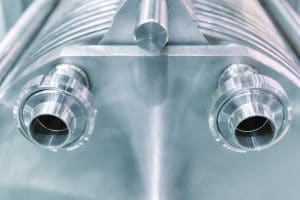 The many significant differences between older cooling solutions and modern heat exchangers typically stem from one main transformation – the way in which they approach electrical cooling. Traditionally, electrical cooling units were comprised of air conditioners or air compressors, which keep electrical enclosures cooled by circulating chilled air throughout their interiors. By contrast, modern heat exchangers operate by continuously transferring electrical waste heat away from sensitive electrical components, before it has a chance to accumulate. This creates a multitude of advantages over more conventional cooling solutions, including significantly reducing the costs of a company’s operations. (more…)
The many significant differences between older cooling solutions and modern heat exchangers typically stem from one main transformation – the way in which they approach electrical cooling. Traditionally, electrical cooling units were comprised of air conditioners or air compressors, which keep electrical enclosures cooled by circulating chilled air throughout their interiors. By contrast, modern heat exchangers operate by continuously transferring electrical waste heat away from sensitive electrical components, before it has a chance to accumulate. This creates a multitude of advantages over more conventional cooling solutions, including significantly reducing the costs of a company’s operations. (more…)
Enhanced Electrical Cooling for Consumer Products
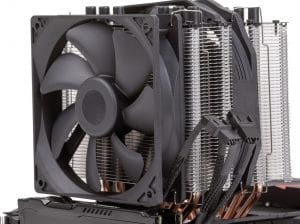 For most companies, the most important goals in streamlining their electrical thermal management processes is to improve the efficiency, productivity, and safety of their operating equipment. Electrical cooling solutions play a dominant role in just how optimal any given application’s operations are, and utilizing more advanced heat exchanger technologies helps companies ensure optimal performance at minimal costs. Yet, the benefits of implementing more efficient and cost-effective production processes also extend to the quality of products that companies create. For consumer products that are also designed around technology, enhanced electrical cooling can also directly impact customers’ satisfaction. (more…)
For most companies, the most important goals in streamlining their electrical thermal management processes is to improve the efficiency, productivity, and safety of their operating equipment. Electrical cooling solutions play a dominant role in just how optimal any given application’s operations are, and utilizing more advanced heat exchanger technologies helps companies ensure optimal performance at minimal costs. Yet, the benefits of implementing more efficient and cost-effective production processes also extend to the quality of products that companies create. For consumer products that are also designed around technology, enhanced electrical cooling can also directly impact customers’ satisfaction. (more…)







